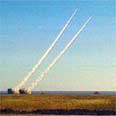
According to the equation accepted by the world, it's legitimate to use conventional weapons in response to a conventional attack, and similarly, non-conventional (nuclear, chemical, or biological) weapons in response to a non-conventional attack.
Six decades after the first and only use of nuclear weapons so far (since then, Egypt and Iraq made limited use of chemical weapons) the time has come to check whether this equation is still relevant. In my view, Israel should regain its deterrent power by threatening a nuclear reaction in response to a conventional attack of similar magnitude.
Here's a scenario: Israel is attacked, by Syria for example, with conventional weapons of equal magnitude to tactical non-conventional weapon – for example, the firing of a thousand missiles, each weighing a ton, within a short period of time. The overall power of such assault is a kiloton (million kilos of explosives) and is of equal magnitude to a tactical nuclear bomb, which can be fired using a suitable cannon.
For the tiny Israel, with its high population density, the result of such assault in national terms could constitute a much graver disaster than what happened to Japan. This raises the question, which is theoretical but could become practical one of these days, of what is the appropriate response? A conventional attack with the power of a tactical nuclear attack, or perhaps a nuclear attack?
This question is relevant today more than it was in the past. There's no doubt the quantity of conventional arms that can be fired at all regions of the country by Hizbullah, Syria and Iran is of equal magnitude to the power of a tactical nuclear weapon. What's more, the quantity and quality of firing means will only be boosted in the near future, in light of the recent war's results.
Ahead of the public debate on the matter, we should know the following:
- The mere discussion of the possibility of a nuclear response to a conventional attack of equal magnitude is the first means for breaking the current common conception that views nuclear arms as a "doomsday weapon" only. The mere raising of this question for public debate prepares the option of using it, and the expression of views both in favor and against it is an important tool available to decision-makers.
- Raising this question for local public debate will soon filter into global public opinion, and there too voices will be heard that either reject or require a nuclear response to a conventional attack of equal magnitude. The legitimacy for a positive response to this question will grow by virtue of the discussion in Israel and abroad.
- The mere public discussion of this question raises (from a likelyhood of near zero) the chances of using this option. This will certainly be taken into account by various elements, be it countries such as Syria and Iran or terror groups supported by them and operating from a country such as Lebanon.
- The question of whether the Iranian nuclear program can be stopped by a conventional attack or only through the use of tactical nuclear weapons is also relevant for this proposed discussion. In light of the results of the recent war in Lebanon, it appears we do not possess a conventional response to Teheran's nuclear program.
- The current discussion focuses on the question of the army's readiness and politicians' wisdom. Let's assume that in the near feature a consensus will emerge that flaws within the military were minimized and the political echelons of the highest caliber. Under such ideal conditions, does the State of Israel have a conventional response to a conventional attack of nuclear magnitude? In my view, the answer to this when examining a variety of scenarios is negative.
As this subject constitutes an existential problem for the State of Israel, it is my personal opinion that discussing this question and boosting the probability of resorting to a tactical nuclear response will lead us away from the policy of vagueness that was accepted without argument for almost five decades.
However, isn't the world in general, and Middle East in particular, facing a change to acceptable equations?
Professor Ido Kanter is a member of Bar Ilan University's physics department















